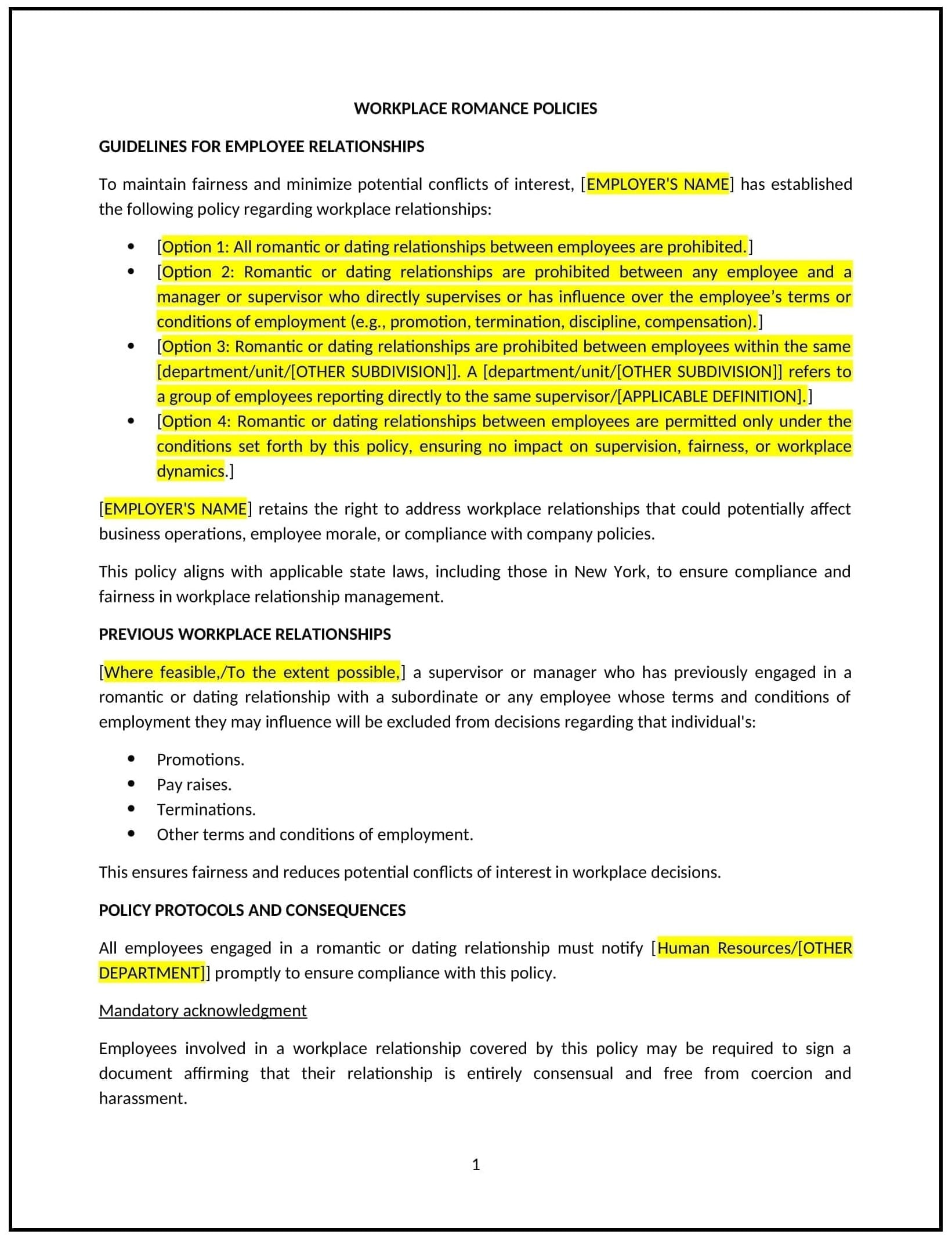Got contracts to review? While you're here for policies, let Cobrief make contract review effortless—start your free review now.

Customize this template for free
Workplace romance policy (New York)
This workplace romance policy is designed to help New York businesses establish clear guidelines for managing romantic relationships between employees. Whether businesses are addressing concerns related to conflicts of interest, harassment, or the impact on workplace dynamics, this template provides a structured approach to handling workplace romances and maintaining a professional and respectful environment.
By adopting this template, businesses can reduce potential risks, foster a healthy workplace culture, and set clear expectations regarding romantic relationships at work.
How to use this workplace romance policy (New York)
- Define workplace romance: Clearly specify what constitutes a workplace romance, including relationships between employees, supervisors, or employees and clients.
- Outline disclosure requirements: Detail the process by which employees must disclose romantic relationships, particularly if one party holds a supervisory or decision-making role over the other.
- Address conflicts of interest: Explain how the company will manage situations where a romantic relationship could create a conflict of interest, such as decision-making power, favoritism, or bias.
- Set boundaries for acceptable behavior: Provide guidelines for maintaining professionalism and appropriate conduct in the workplace, ensuring that personal relationships do not interfere with job performance or workplace dynamics.
- Establish consequences for policy violations: Specify the actions that will be taken if the policy is violated, including disciplinary measures such as warnings, reassignment, or termination, depending on the situation.
Benefits of using this workplace romance policy (New York)
This policy offers several benefits for New York businesses:
- Prevents conflicts of interest: Clear guidelines help businesses manage potential conflicts that could arise from romantic relationships, particularly those involving supervisors or employees with significant decision-making power.
- Promotes professionalism: Establishing boundaries for behavior ensures that workplace romances do not disrupt work performance, teamwork, or business operations.
- Reduces legal risks: By addressing potential issues like harassment or favoritism upfront, businesses can reduce the risk of legal claims related to workplace romances.
- Enhances workplace culture: A transparent policy fosters a respectful and equitable work environment, where all employees feel comfortable and supported, regardless of personal relationships.
- Ensures consistency: A clear policy ensures that all employees are treated equally when it comes to workplace romances, avoiding any appearance of favoritism or inconsistency in enforcement.
Tips for using this workplace romance policy (New York)
- Communicate the policy: Ensure all employees are aware of the policy and understand the process for disclosing relationships and the consequences for failing to comply.
- Monitor potential conflicts: Be proactive in identifying situations where a romantic relationship may create a conflict of interest and address them promptly to prevent issues.
- Offer training: Provide training on maintaining professionalism and appropriate behavior in the workplace, including discussions on boundaries and ethics in romantic relationships.
- Foster an inclusive culture: Encourage an open, respectful workplace culture where employees feel comfortable discussing relationships and potential conflicts of interest without fear of retaliation.
- Review regularly: Update the policy as necessary to reflect changes in New York state laws, business practices, or employee concerns related to workplace relationships.